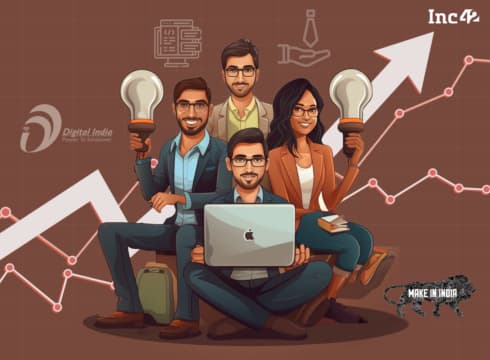India's GDP is projected to experience a surge of 5-10% by 2030 on the back of an ever-increasing battalion of Indian startups, including unicorns and soonicorns, among other factors
The startup-led disruption will not only result in job creation but also transform consumption patterns, with new-age ventures addressing many challenges across sectors and industries
With a GDP growth rate of 6%, India's economy is expected to outpace the growth of the United States (4%) and the European Union (1%), trailing only behind China (9%) in the next decade
Inc42 Daily Brief
Stay Ahead With Daily News & Analysis on India’s Tech & Startup Economy
There is no denying the fact that India today has firmly established itself as one of the largest global hubs for innovation and entrepreneurship.
Not to mention, the country’s burgeoning startup ecosystem, which saw the launch of over 68K startups between 2014 and June 2023, has played a pivotal role in catalysing the nation’s reputation as the hotbed of innovation, and revolutionary ideas and technologies.
The surge in the number of startups being churned out can be attributed to several positive factors, including a tech-savvy youth population, an expanding middle class, and a favourable regulatory landscape.
And it is on the back of these key elements, along with an ever-increasing battalion of Indian startups, including unicorns and soonicorns, India’s Gross Domestic Product (GDP) is projected to experience a surge of 5-10% by 2030, outlines the 2023 edition of Inc42’s “The Ecosystem” report.
With a GDP growth rate of 6%, India’s economy is expected to outpace the growth of the United States (4%) and the European Union (1%), trailing only behind China (9%) in the next decade.
Indian Startups To Become Key Drivers Of Growth
Indian startups have transitioned from being primarily service-oriented to becoming leaders in product innovation, demonstrating their technological prowess across various sectors. This transformation has elevated India’s stature on the global tech stage, drawing parallels with more established economies.
Further, the increasing annual household income has contributed significantly to this growth. Projections show that approximately 50% of households are set to have an annual income exceeding INR 5 Lakh by 2030, up from 33% in 2019.
Download The ReportThis rise, combined with over 23 Mn households expected to earn more than INR 20 Lakh by 2030, will boost consumer spending.
Other factors expected to give India’s GDP a booster dose are
- The number of tech startups is predicted to grow 2.6X from 68K in 2023 to 1.8 Lakh in 2030, resulting in a substantial rise in job opportunities. The startup ecosystem has already generated over 768K jobs since 2014.
- India holds the position of the world’s largest consumer internet market, with tech giants like Google, YouTube, WhatsApp, and Facebook amassing millions of Indian users.
- Emerging tech startup hubs in Tier II cities, such as Jaipur, Kolkata, and Chandigarh, are fostering a new wave of entrepreneurship and innovation.
- As deep-pocketed global investors recede, domestic investors are entering the ecosystem, leading to increased investments and cash flow within the economy.
- Investor engagement is set to grow by 46% by 2030, with Indian high-net-worth individuals (HNIs) and family offices demonstrating strong enthusiasm for the Indian startup ecosystem.
- The number of Indian HNIs is projected to reach 1.7 Mn by 2027, growing at a CAGR of 16%, outpacing growth rates in other major economies.
Notably, the startup-led disruption will not only result in job creation but also transform consumption patterns, with new-age ventures addressing many challenges across sectors and industries.
Furthermore, India’s relatively untapped market offers burgeoning startups the chance to enter uncharted territories and address significant real-world issues, contributing to the nation’s economic upliftment.
Marching Ahead Despite Headwinds
Despite the optimism that the Indian startup economy is the third-largest in the world today, challenges persist.
One of the primary pain points is the need for sustained funding access across various growth stages of startups, which right now is the bone of contention between investors and founders. Regulatory complexities and bureaucratic obstacles, too, have impacted the operations of many startups working in specific sectors — one such example is the online gaming industry.
Today, the need of the hour is to streamline processes and cultivate a startup-friendly regulatory environment to sustain the momentum that the country has received from the startup boom. This is especially crucial at a time when Indian startups have a key role to play in the evolution of technologies like AI, blockchain, and IoT, among others.
Additionally, Indian startups have not only expanded within the country but also globally, with a significant surge in exports and the success of the D2C startup ecosystem in international markets. According to an Inc42 analysis, more than 20 digital-first brands have already made their foray into international markets like the UAE, the US, and the UK, just to count a few.
The startup surge in India heralds a new era of economic progress and innovation. With a potent blend of youth, tech prowess, supportive policies, and real-world problem-solving strategies, Indian startups are set to play a pivotal role in boosting the nation’s GDP.
As startups continue to drive job creation, introduce disruptive technologies, and reshape consumer behaviour, the influence of startups on India’s economy is destined to solidify going ahead, paving the way for the country to become the world’s biggest startup powerhouse in the years to come.
Download The Report{{#name}}{{name}}{{/name}}{{^name}}-{{/name}}
{{#description}}{{description}}...{{/description}}{{^description}}-{{/description}}
Note: We at Inc42 take our ethics very seriously. More information about it can be found here.


